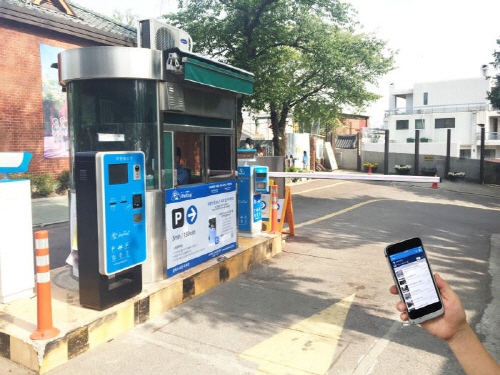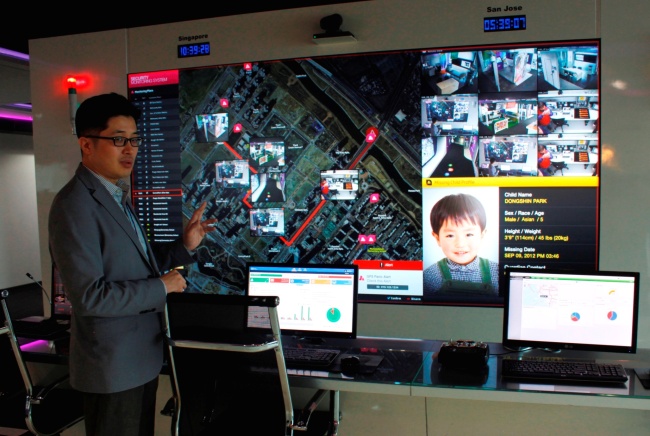A few years ago, office worker Lee Yu-na had a nightmare finding parking space when visiting Bukchon Hanok Village, one of the popular tourist destinations in northern Seoul.
Despite her unsavory memory of paying fines for parking her car in a no-parking area, she had to visit the village again last month, on request by her friend from the U.S. But this time she felt more confident.
 |
A smart parking lot management solution developed by smart parking app operator ParkingCloud is installed at the Jeongdok Library in Bukchon, Seoul. (ParkingCloud) |
Lee readily spotted an empty parking space thanks to smartphone app iParking, which shows information of around 800 parking lots across the nation, utilizing GPS technology.
“Finding a parking space near the bustling Bukchon Village, especially during peak holiday season, used to be almost impossible,” the 30-year-old office worker said.
She paid the fee with her mobile credit card registered on the app, which is also compatible with mobile payment solutions Samsung Pay and Kakao Pay.
Starting from a parking lot at the Busan Station in Busan City in February 2015, ParkingCloud, the operator of the parking mobile app, has also installed its smart parking solution fitted with automatic charging systems at more than 60 parking lots run by individuals or public offices across the nation.
After touring the traditional village, Lee found a dining place in Insa-dong, a tourist spot near the village, via restaurant recommendation app Yap. Once in Insa-dong, she immediately received a push notification for discount coupons that could be used at restaurants there.
The mobile app for smart parking and restaurant recommendation services is just one aspect of the IT solutions being deployed in urban regeneration projects nationwide.
 |
Cisco Korea’s GPS-based location-tracking system is aimed to prevent children from getting lost. (Cisco Korea) |
Joining hands with tech companies, the governments of metropolitan cities or small counties are competitively trying to facelift their regions with smart technologies and spur community development.
Their efforts are in line with the central government’s urban planning initiatives.
The Ministry of Land, Infrastructure and Transport plans to spend 140 billion won ($115.6 million) by 2017 to refurbish 43 run-down areas in cities across the nation.
The Busan City government, for example, is working with companies, including network operator SK Telecom, to build a smart city in Haeundae-gu, a residential area, and solve urban issues including traffic congestion, pollution and energy shortage through big data and Internet of Things technologies.
SKT’s IoT services in the city from this year will include motion-detecting smart street lamps, GPS location-tracking services to safeguard kids, mobile parking app services, smart energy management solutions for buildings, and beacon-based marketing services for mom-and-pop stores.
Songdo, flush with skyscrapers, is also at the forefront in deploying smart tech for urban renewal.
The Incheon City government worked with Cisco to have upscale apartment complexes in the Songdo area fitted with video conference systems, allowing residents to take educational classes or meetings with neighbors.
The city government also monitors the real-time traffic information on bridges connecting Songdo, built upon 600 hectares of reclaimed land, to the inland.
By Kim Young-won (
wone0102@heraldcorp.com)









![[Today’s K-pop] Blackpink’s Jennie, Lisa invited to Coachella as solo acts](http://res.heraldm.com/phpwas/restmb_idxmake.php?idx=644&simg=/content/image/2024/11/21/20241121050099_0.jpg)